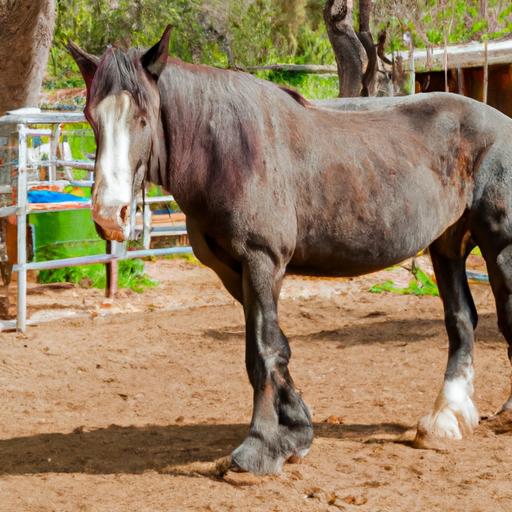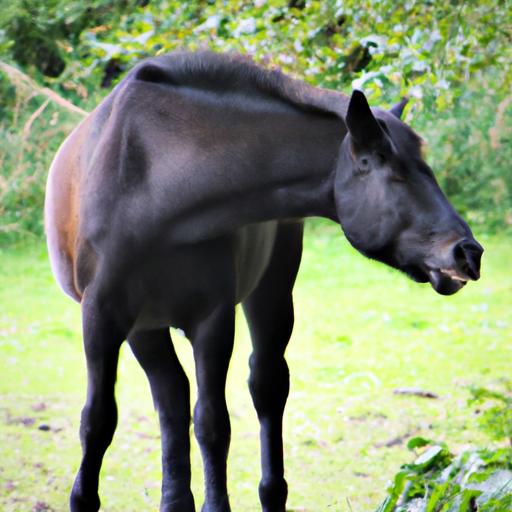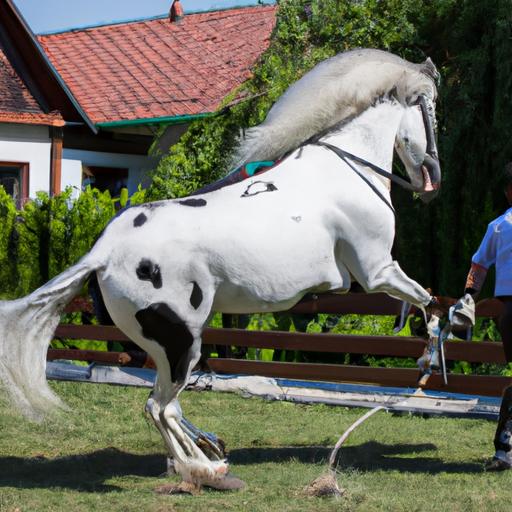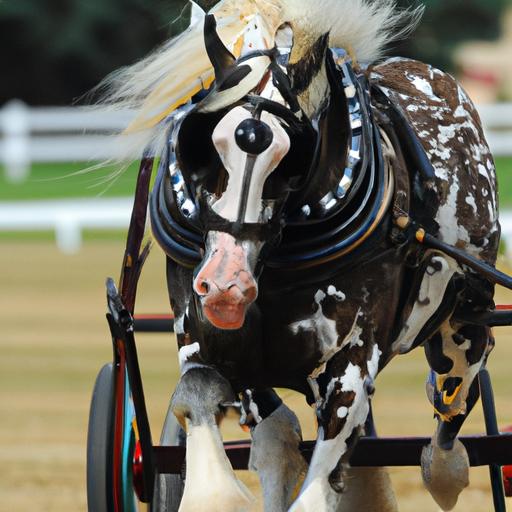Unlock the secrets of hackney horse behavior for effective training and handling. Explore their unique characteristics and instincts. Expert insights here.
Introduction

Do you ever wonder what makes Hackney horses so captivating? Their regal appearance and spirited nature make them a sought-after breed for driving enthusiasts. But to truly harness their power and form a harmonious partnership, it is crucial to dive deep into the intricacies of Hackney horse behavior. In this article, we will explore the unique characteristics of Hackney horses, understand their natural instincts, and emphasize the importance of comprehending their behavior for effective training and handling.
Overview of Hackney Horses
Originating from England, Hackney horses have long been admired for their elegance, endurance, and exceptional trotting abilities. They have gained immense popularity as driving horses, captivating audiences with their high-stepping action. Hackneys possess a distinctive conformation, characterized by a well-arched neck, powerful hindquarters, and an upright carriage. Their expressive eyes and proud demeanor make them a true sight to behold.
Importance of Understanding Hackney Horse Behavior
To truly excel in training and handling Hackney horses, one must delve into the depths of their behavior. Each Hackney horse possesses a unique temperament, which influences their responses to various stimulBy understanding their behavior, we gain valuable insights into their natural instincts, enabling us to build trust, establish boundaries, and develop effective communication.
Hackney horse behavior is not simply about taming their spirit but rather channeling their energy and drive towards productive goals. By comprehending their behavioral patterns, we can tailor training methods that resonate with their innate characteristics, leading to a more fulfilling and successful partnership.
So, let’s embark on a journey into the fascinating world of Hackney horse behavior, unlocking their true potential and forging an unbreakable bond.
Understanding Hackney Horse Behavior

General Characteristics and Temperament of Hackney Horses
When delving into the world of Hackney horse behavior, it is essential to familiarize ourselves with their general characteristics and temperament. Hackney horses are known for their high energy levels, intelligence, and strong work ethic. They possess an inherent drive to perform, which contributes to their exceptional trotting abilities. Their finely-tuned senses make them quick to react and adapt to their surroundings.
Hackney horses exhibit a proud and confident demeanor, often displaying a strong desire for attention and interaction. While their spirited nature can be captivating, it also requires careful handling and training to channel their energy effectively.
Natural Instincts and Behavior Patterns Exhibited by Hackney Horses
To truly understand Hackney horse behavior, we must explore their natural instincts and behavior patterns. Hackneys have a keen sense of self-preservation, which manifests in their alertness and sensitivity. They possess a strong flight response, making them prone to spookiness if they perceive a threat or unfamiliar situation.
Additionally, Hackney horses have a natural inclination towards hierarchy and social dynamics. They establish pecking orders within their herd, displaying dominance or submission behaviors. Understanding these natural instincts can help horse handlers establish themselves as trusted leaders and maintain a harmonious relationship.
Factors Influencing Hackney Horse Behavior
Various factors influence Hackney horse behavior, including genetics and environment. Genetic predispositions can influence personality traits, such as sensitivity or boldness. It is essential to consider the individual horse’s genetic background when assessing their behavior tendencies.
Moreover, the environment plays a significant role in shaping Hackney horse behavior. Factors such as socialization, training methods, and daily routines can impact their overall temperament and responses. Creating a positive and supportive environment can help foster desirable behavior traits and minimize undesirable ones.
By understanding the general characteristics, natural instincts, and influential factors of Hackney horse behavior, we lay the foundation for effective training and handling strategies. In the next section, we will explore common behavioral issues that Hackney horses may exhibit, and discuss ways to address them.
Common Behavioral Issues in Hackney Horses

Hackney horses, like any other breed, can exhibit certain behavioral issues that require attention and understanding. By being aware of these common challenges, we can address them with appropriate training and handling techniques, fostering a harmonious relationship with our equine companions.
Aggression and Dominance Behavior
Some Hackney horses may display aggression and dominance traits, which can pose challenges during training and handling. It is important to identify the underlying causes of such behavior, whether it stems from fear, insecurity, or a lack of clear boundaries. By establishing ourselves as confident leaders and implementing consistent training methods, we can effectively address aggression and dominance issues, promoting a calmer and more cooperative demeanor.
Nervousness and Spookiness Tendencies
Hackney horses, with their sensitive nature, may exhibit nervousness and spookiness tendencies in certain situations. This can be attributed to their heightened awareness and reactive instincts. To mitigate these behaviors, it is essential to provide a safe and supportive environment, gradually exposing them to new stimulBy introducing desensitization techniques and positive reinforcement, we can help Hackney horses overcome their fears and build confidence, resulting in a more reliable and composed partner.
Behavioral Problems Related to Handling and Training
Behavioral problems in Hackney horses can also arise from improper handling and training methods. Inconsistent cues, harsh corrections, or inadequate communication can lead to confusion, resistance, and even rebellious behavior. It is crucial to employ ethical and positive reinforcement training techniques that promote trust, respect, and clarity. By establishing a strong foundation of trust, Hackney horses can become willing participants in their training, yielding better results and a stronger bond between horse and handler.
By addressing these common behavioral issues, we can unlock the true potential of Hackney horses and foster a partnership built on trust, respect, and effective communication. With patience, understanding, and the right approach, we can overcome these challenges and embark on a rewarding journey with our Hackney companions.
Training and Handling Techniques for Hackney Horse Behavior
Positive Reinforcement Training Methods
When it comes to training Hackney horses, positive reinforcement techniques are highly effective in shaping their behavior. By rewarding desired behaviors with treats, praise, or a gentle pat, we create a positive association and motivate them to repeat those behaviors. This approach not only enhances their learning experience but also fosters a trusting and cooperative relationship between horse and handler.
Establishing Trust and Respect
Building trust and respect is paramount in handling Hackney horses. Consistency in our actions and handling practices is key to gaining their trust and establishing ourselves as confident leaders. By setting clear boundaries and expectations, we provide them with a sense of security and guidance. Gentle but firm handling, coupled with patience and understanding, goes a long way in developing a respectful partnership.
Addressing Specific Behavioral Issues
Each Hackney horse may present unique behavioral challenges. It is essential to address these issues with appropriate training techniques tailored to their specific needs. Whether it’s aggression, nervousness, or resistance, understanding the underlying cause is crucial. By identifying triggers and implementing suitable training methods, we can effectively modify their behavior and guide them towards more desirable responses.
Remember, consistency, patience, and empathy are key elements in training and handling Hackney horses. By employing positive reinforcement, establishing trust and respect, and addressing specific behavioral issues, we can unlock their potential and cultivate a harmonious partnership based on mutual understanding and cooperation. So, let’s embark on this exciting journey of training and shaping the behavior of our remarkable Hackney horses.
Preventive Measures for Managing Hackney Horse Behavior
Providing a Suitable Environment and Routine
Creating a conducive environment plays a crucial role in managing Hackney horse behavior. These magnificent creatures thrive in a well-maintained and stimulating space. Ensure that their living quarters are spacious, clean, and free from potential hazards. A comfortable and safe environment allows Hackney horses to relax, reducing stress and promoting positive behavior.
Establishing a consistent routine is equally important. Hackney horses are creatures of habit and appreciate a predictable schedule. Regular feeding times, exercise routines, and social interactions provide them with a sense of security and stability. By adhering to a structured routine, we can enhance their overall well-being and minimize behavioral issues.
Proper Nutrition and Exercise
Just like humans, Hackney horses require a balanced diet to maintain optimal physical and mental health. Providing them with high-quality forage, supplemented with appropriate concentrates, ensures they receive all the necessary nutrients. Consult with equine nutritionists or veterinarians to design a diet plan tailored to their individual needs.
Exercise is another vital aspect of managing Hackney horse behavior. These spirited horses possess abundant energy that needs to be channeled constructively. Regular exercise, such as lunging, longeing, or driving, not only helps them burn off excess energy but also promotes muscle development and mental stimulation. Engaging in activities that simulate their natural instincts, such as obstacle courses or trail rides, can also provide them with a sense of purpose and fulfillment.
Regular Veterinary Care and Health Issues
Maintaining the overall health of Hackney horses is imperative for managing their behavior. Regular veterinary check-ups, vaccinations, and deworming are essential to prevent any underlying health issues that may contribute to behavioral problems. Additionally, addressing dental care, hoof care, and any discomfort or pain promptly ensures their physical well-being, which directly impacts their behavior.
It is crucial to stay vigilant for any signs of discomfort or abnormal behavior. Hackney horses, like any other breed, may experience health issues such as lameness, digestive disorders, or respiratory problems. Early detection and prompt treatment are key to preventing these issues from impacting their behavior negatively.
By implementing these preventive measures, we can create an environment that promotes balanced behavior in Hackney horses. With proper nutrition, exercise, and regular veterinary care, we pave the way for a harmonious partnership built on trust and well-being.


